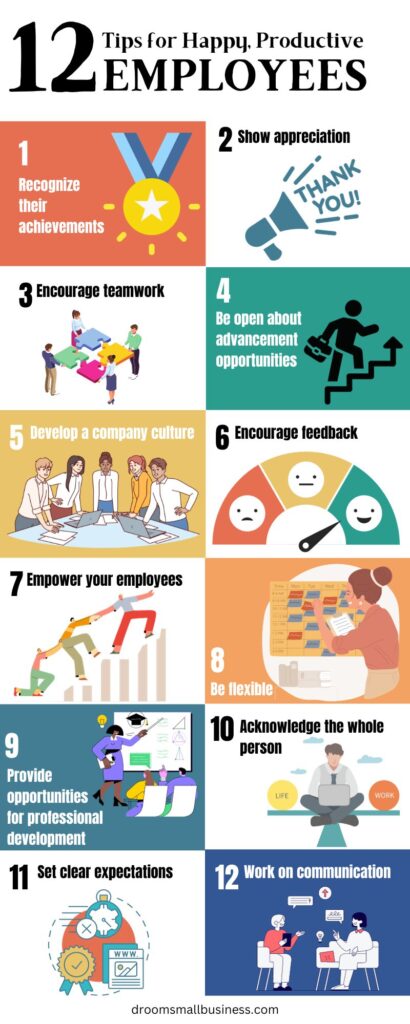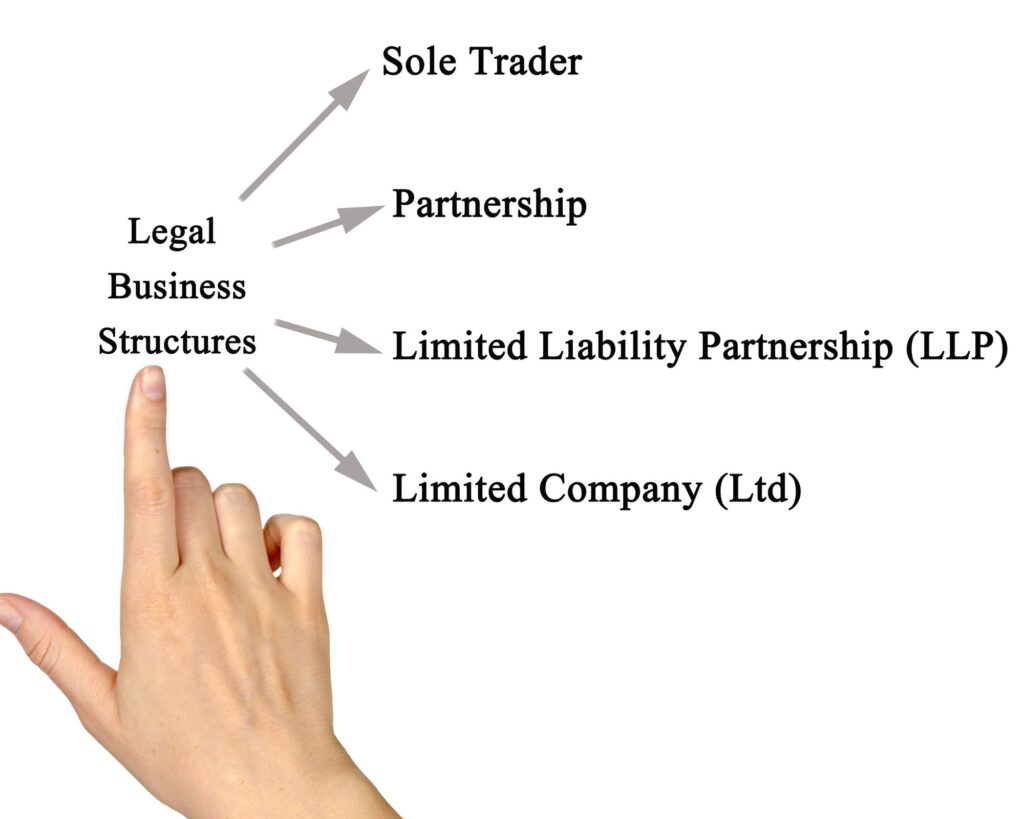
Want productive, happy employees who are excited to come to work and perform well? Then read on to learn 12 secrets to small business employee motivation.
I’m pretty sure smoke came out of my ears like a steam engine from the early 1900’s. I was beyond pissed off.
I knew it, my coworkers knew it, and I’m pretty sure all 10 customers in line knew it too. Between the micromanaging, being stuck with a manager’s responsibilities without a manager’s pay, and not getting a bathroom break during my 8-hour shift, I was more than frustrated with my job.
I was so close to blowing up that day. I ended up quitting about 2 weeks later. And I was far from the only one.
That little Subway on the corner of Tramway Blvd and San Rafael Ave had a high turnover. If the owners and managers had spent a little more time learning about small business employee motivation, they could have spent less time hiring new employees.
Disclosure: Our website participates in various affiliate marketing programs, which means we may earn a commission on purchases made through our affiliate links. We only promote products and services that offer value to small business owners. Just as a quick reminder, the following information is not legal advice. Be sure to speak with a local attorney before making legal decisions about your business.
What’s the Big Deal About Small Business Employee Motivation?
People will be quick to complain that nobody wants to work anymore. Or they might say something like it’s hard to find “good help.”
And in certain situations it’s true, not everyone you hire will be a good fit.
But here’s the thing, if you run a small business you can’t do everything alone. You rely on your staff to help things run smoothly.
You need them. And more importantly, you need them happy and ready to show up and do their job well.
Your employees are often the face of your business. They’re who your customers will interact with and have a huge impact on what people think about your business.
They directly impact your business growth and your profits.
So if your employees aren’t happy and don’t do a good job, you have a problem. Which means learning how to keep them motivated and inspired to perform well should be a priority.
Motivated employees will help your business grow and thrive. Unmotivated employees will have your business sinking faster than the Titanic.
Why more money isn’t enough
When it comes to small business employee motivation, your first thought might be “Well, I provide them with a paycheck. Isn’t that enough?”
Well… no. According to an article published on Forbes:
“Monetary incentives can work to motivate workers, however, money alone is not sufficient. Research suggests employees are happier when they enjoy their job, feel appreciated and value their employer. Employees want to feel that their hard work pays off and is contributing to the success of the company.”
When you depend on money alone to motivate employees, you run into a problem of them seeing their job as nothing but a paycheck. And if they don’t enjoy working for you, they will start looking for their paycheck somewhere else.
When I quit working at Subway, it didn’t matter what they paid me. Even if they had offered to promote me to a manager and pay me for the responsibilities I was already doing, I still would have left.
I felt taken advantage of, overworked, and unappreciated. And more money wouldn’t undo all those bad feelings.
People need more than money to feel motivated at their job.
Why Your Employees Aren’t Motivated
So why aren’t your employees motivated? If it’s not more money, what do they want?
First, let’s talk about what they don’t want. Small business employee motivation is as much about avoiding the wrong environment as it is about creating the right one.
Here are some things guaranteed to tank the motivation of your employees. If you notice any of these red flags in your own business, it’s time for a change.

Unclear expectations
The first thing that can drag down your employee’s motivation is unclear expectations. No one wants to spend their day trying to be a mind-reader.
Employees can become frustrated trying to guess what needs to be done. It not only leaves them floundering through basic tasks, but it also slows down their productivity.
It costs them time and you money.
The time they spend running around trying to guess what you want them to do could be spent working on other tasks that help your business.
Unclear expectations were another reason my job at Subway was short-lived. When I took over the manager shift, no one taught me what to do when the Quality Control Inspector came by.
I was 1 step away from failing the inspection the first time he came by during my shift.
I was stressed, felt terrible about the inspection, and got lectured by my boss. The whole scenario could have been avoided had someone explained to me the protocols that needed to be taken care of beforehand.
Unclear expectations are a quick way to have your small business staff dreading coming to work.
Negative environment
Another common cause of employees feeling unmotivated is a negative work environment. This is a big one.
No matter how good the pay is or how much an employee might love their job, if they dread coming to work because of a toxic environment, they won’t last long.
A negative environment can come in many forms. A hypercritical boss, constant gossip and drama between coworkers, or even a physically uncomfortable workspace.
Whatever the cause may be, you need to address and correct any negativity in the workplace as soon as possible.
Feeling unappreciated
Another reason your employees aren’t motivated is they don’t feel appreciated. This might seem like a small thing, but it has a big impact on how well they perform, how productive they are, and whether they keep showing up for work.
In fact, a study done by Nectar showed some interesting results:
- 83.6% of employees feel that recognition affects their motivation to succeed at work.
- 77.9% of employees would be more productive if they were recognized more frequently.
- 81.9% of employees agree that recognition for their contributions improves their engagement.
The numbers don’t lie. Being acknowledged (or not acknowledged!) has a big impact on how well your employees perform.
Micromanaging
If you feel like you do most of these right, but you still have a problem with small business employee motivation, then it could be a case of micromanaging.
Micromanaging is when an employer or manager scrutinizes and controls every aspect of their employee’s work. And it’s a surefire way to kill motivation and productivity.
No one likes to feel like they’re always watched and criticized.
Micromanaging adds unnecessary stress and can cause your employees to feel like you don’t have faith in their abilities.
This leads to a decrease in creativity, independence, and growth in an employee’s role. Your employees feel stifled and unchallenged, which is a quick way to cause them to lose interest in their jobs.
Lack of interest
The last reason employees are unmotivated is they lack interest in their job. We’ve all been stuck with a cashier going so slow that we can feel ourselves aging as they ring us up.
They’d rather be anywhere else but at work. And slow customer service leaves a pretty bad impression.
Maybe the job isn’t a good fit for their skills, maybe they don’t like what they’re doing, or maybe they’re mom made them get this job and they’re just mad at the world in general.
Sometimes, you won’t know why your employees don’t seem to care about their performance.
But the fact remains that lackluster employees can still negatively impact your business. So it’s important to have a plan in place to get your employees fired up and excited to work.
Small Business Employee Motivation: 12 Tips for Happy, Productive Employees
Now let’s dive into what it takes to have happy and productive employees!

1.) Recognize their achievements
The first step in building small business employee motivation is recognizing the achievements of your employees. If your employee does a good job, let them know.
This can be through a simple “thank you” or even a small recognition like an employee of the month program. You could even offer incentives like a bonus or extra time off for exceptional work.
This shows your employees that their hard work is noticed and valued. Which motivates them to continue to do a good job.
2.) Show appreciation
Another good way to build small business employee motivation is to show appreciation. If feeling unappreciated demotivates employees, a simple solution is to show them some love.
You could do this through small gestures like bringing in donuts, leaving a thank you note on their desk, or even just saying “good job” after they finish a task.
Appreciation doesn’t have to be anything grand, but showing it can go a long way in boosting motivation and morale. Plus, it’s free and only takes a few minutes.
3.) Encourage teamwork
Another way to help your employees feel motivated is to encourage teamwork. Let employees work together on projects, collaborate on ideas, and support each other.
When employees feel like they’re part of a team and have the support of their coworkers, it can create a positive work environment that boosts motivation and productivity.
This also builds a sense of community that’s great for keeping employees engaged.
Related Posts:
- Growth & Marketing: The Key Importance of a Website for Business
- Legal Forms of Business: How to Choose the Right Business Structure
- How to Come Up With a Brand Name That Attracts Customers
- 8 Easy Steps to Hiring the Best Interns for Your Small Business

4.) Discuss advancement opportunities
Another way to incentivize employees and encourage them to do their best is to be open about advancement options. Let them know what types of positions or opportunities are available to them when they work hard and do a good job.
Often knowing what’s expected at the next level will inspire employees to work harder and strive for the next step in their career.
This not only motivates them but can also help with employee retention as they see a future within the company.
5.) Develop a company culture
A large part of keeping employees motivated is the company culture. A company culture is the personality of your company. It’s made up of the values, behaviors, and expectations of your business.
If someone sat down and explained what it was like working at your company and how the environment felt, that would be your company culture.
As the owner or manager, you have a lot of influence on this part of your business. But if you’re like, “Wait, I don’t have a company culture.” Trust me, you do.
A company culture is something that develops whether or not you create one intentionally. As people come together to work for you, it will develop all by itself.
If you want to ensure your business embraces and creates an environment that motivates employees, you need to start setting the right expectations within the company culture.
6.) Encourage feedback
Another way to encourage small business employee motivation is to ask for feedback from your employees. Let them know their opinion is valued.
Whether it’s through an anonymous suggestion box, regular surveys, or an open-door policy for discussion and suggestions, giving your employees a voice can cause them to feel valued and motivated.
7.) Empower your employees
Another way to help inspire your employees is to empower them. Remember how we talked about how micromanaging is a motivation killer? Empowering your employees is the antidote.
When you empower your employees, you give them autonomy and responsibility in their roles. Instead of being someone who just has to do what they’re told, they’ve now become a valued team member.
This not only shows you trust them and value their skills but also allows for personal growth and development within the company.
Empowering employees also leads to a much more pleasant work environment for everyone.
8.) Be flexible
Another way to boost motivation with your employees is to be flexible wherever possible. When work conditions are rigid or difficult to meet, it can cause stress for your employees.
Which, of course, lowers motivation.
For example, if your employee has a doctor’s appointment, instead of making them take the whole day off, see if they can come in late or leave early. Or offer flexible hours for those who have other responsibilities outside of work.
Understanding and accommodating your employees’ needs shows you value their well-being and creates a positive work environment where they feel motivated to do their best.
9.) Provide opportunities for professional development
Another important part of small business employee motivation is making sure your employees feel like they can grow and develop in their roles. Not only does this help with retention but it also boosts motivation and productivity.
Opportunities for professional development, whether it’s through training programs, workshops, or conferences, show your employees you value their personal growth and want to invest in their success within the company.
Many employees want a position where they feel like they can continue to grow their careers and have a long-term future. Professional development opportunities are a good way to provide this.

10.) Acknowledge the whole person, not just the job they do
If you want your employees to feel happy and productive, it’s important to acknowledge that they have lives outside of work. They’re more than just the role they fill at your company.
Encourage a healthy work-life balance by respecting their personal time and making it possible for them to take breaks and vacations.
Recognize they have personal responsibilities and allow for flexibility when necessary. This not only helps prevent burnout but also shows you value your employees as individuals, not just the work that they do.
When employees feel respected and supported, it can increase their motivation to work hard and contribute to the company’s success.
11.) Set clear expectations
An often overlooked, but important part of keeping your employees motivated is clear expectations. This is one many small business owners overlook.
Entrepreneurs are so used to being a jack of all trades and figuring out the different areas of their business, they forget how important it is to explain what’s expected of their employees.
Unclear expectations can lead to confusion and frustration on both ends. Your employees won’t know what they need to do to succeed, and you’ll be disappointed when things don’t go as planned.
Subway wasn’t the only job I struggled with unclear expectations. I worked at Target for a year when it was time for my annual review. We went through this entire list of standards that I wasn’t meeting.
A list I had never seen or even heard of!!
And because I hadn’t met those standards I got the bare minimum raise for the next year. I felt the disappointment of that meeting for weeks.
As an employee, I couldn’t meet expectations I was unaware of. And the same will be true for your employees as well.
So be sure to outline what you want your employees to do to perform well at their job.

12.) Work on communication
Our last secret for how to improve small business employee motivation is to work on communication. Every relationship is dependent on good communication and the one between you and your employees is no different.
That means:
- providing feedback, both positive and constructive, on a regular basis.
- being transparent about company goals, changes, and expectations.
- showing appreciation for a job well done.
- asking for feedback and listening to their concerns.
Good communication not only builds trust and respect between you and your employees but also helps prevent misunderstandings and promotes a positive work environment. This in turn can raise employee motivation.
Final Thoughts on Small Business Employee Motivation
Employees are vital for the success of small businesses. It’s not something you can afford to put on the back burner and hope your business will still thrive.
Follow these tips and check in with your employees. You’ll create a positive work environment where they feel valued, empowered, and motivated to contribute to the growth and success of your business.
And if nothing else, you’ll save yourself from having visibly ticked-off employees serving your customers during the lunch rush while griping about not having enough bathroom breaks.
Want to learn more secrets and strategies for growing your dream business? Sign up for our newsletter! Every week we’ll send our best tips, tools, and resources straight to your inbox.
More Small Business Resources…

How to Get More Customers to Your Business: 15 Smart Strategies
Looking to help your business grow and thrive? Check out these 15 strategies for how to get more customers to your business. Read more.

How to Write A Killer Business Plan – A Beginner’s Guide
Want a business plan that has people lining up to fund your small business? Learn how with our guide on the business planning process. Read more.

Legal Forms of Business: How to Choose the Right Business Structure
Learn about the different legal forms of business, from sole proprietorships to corporations and everything in between. Read more.
